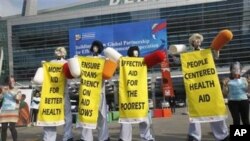As international officials gather for a key aid meeting in South Korea, relief groups fault the world's biggest donor, the European Union, for policies they claim hurt some of the poorest nations.
A new report claims the European Union's policies on agriculture, trade, energy and migration can hurt African and other poor nations, and work against the EU's own aid objectives.
Blandine Bounioul is policy coordinator for Concord, a Brussels-based confederation of aid agencies that released the study. "In some areas…there are major issues, and with these policies the EU is actually worsening the poverty situation or the human rights situation in some developing nations," she said.
A case in point, Bounioul says, are subsidies for European farmers under the bloc's Common Agricultural Policy. "Local farmers in Africa, they cannot compete with European products which, because of the subsidies that European farmers can have, those products end up being sold to African consumers at far lower prices than the local food products."
European Commission spokeswoman for development Catherine Ray says the EU is taking the report seriously. But she described key reforms in recent years, including axing many agricultural subsidies. The EU is also a leading importer of agricultural products from developing nations, even as it promotes self-sufficiency.
"It's obviously important that these countries are able to export in our markets. But traveling in Africa, what we see is before they are able to export, they have to be able to produce for their own community, for their country. And then to come at the global level," she said.
The concerns raised by the Concord study will likely be taken up at an aid summit in South Korea this week. The goal is to make development assistance more effective.
|
Former British Prime Minister Tony Blair spoke with VOA's Victor Beattie about reforming the way aid is given.
|
Former British prime minister Tony Blair told VOA that is more important than ever, as donor nations struggle to balance their international aid commitments with domestic economic concerns.
"It’s a tough challenge for governments to maintain those now, and as you rightly said, how that aid is then used is a big part of whether you get the public consent to carry on giving it. And that’s why I think this conference is very timely because it is focusing specially on aid effectiveness. In other words, how do we make sure that for every dollar we’re spending we’re getting something out of it," he said.
The EU invests about $71 billion in development programs, making it the world's biggest donor. Despite stagnant growth and the eurozone crisis, Catherine Ray says EU nations are generally making progress in meeting their pledge to earmark 0.7 percent of their income for development assistance by 2015.




